Geof Darrow’s work can be described as a forerunner of the Fusion that Frank Santoro and I like to talk about. His work is a mix of Moebius mixed with the frenetic energy of the finer Japanese Manga. I first got into his work, like most, with the excellent Hard boiled. He always grabs me with images that are full of the most ridiculous ideas that under most hands, would probably be a mess but Darrow is able hold it all together. The work available by Darrow is few and far between, but his impact as a cartoonist can be found in the work of many young cartoonists that would stare transfixed on a given image studying every nuance.
This interview was conduct back in February of 2011 when he was set to appear at the Emerald City Comicon and was originally aired on the Inkstuds radio show. When we did the interview, he was pretty close lipped about Shaolin Cowboy. Since then it has been recently revealed that Dark Horse will be publishing future volumes of the series.
Special thanks to Charles Bottomley for continued support in providing excellent transcriptions. Charles also did the transcription work on the Inkstuds book.
Robin McConnell: I guess to run down the comics work, Hard Boiled, Shaolin Cowboy, Big Guy and Rusty the Boy Robot, Bourbon Thret, as well as a plethora of other goodies that came out in France that I have not been able to get my hands on.
Geof Darrow: [laughs] That’s about it, to tell you the truth. There’s a lot of fake titles I came up with that people seem to think exist but never ever…it was joke.
They’re kind of … hopes? Comics you want to do one day, you just know you’ll never have a chance?
No. It was just a joke. The first book I ever did over there…I always liked the Tintin books, because on the back they had this nice drawing of all these titles of Tintin you could buy. So on the first I did, I put all the titles of books of these books that didn’t exist, so it seemed like the character existed as long as Tintin. But you read any of the titles, I can’t believe anybody would think they actually existed. But people didn’t! People would try to order them. The bookstores were kind of annoyed that I’d done that, because they were getting orders for these things. It was funny. I thought it was funny.
Was that something you were doing with Bourbon Thret (said en francais) as well as …
Yeah yeah yeah. Bourbon, actually.
Okay. Sorry, I was trying to be all proper.
No, it’s okay. Bourbon Thret actually is The Shaolin Cowboy in England.
So it’s an earlier incarnation of it or is it the exact same character?
Yeah. It’s basically the same guy.
I want to get a little background on you, because in the time I’ve been putting together this interview, I couldn’t really find very much on you as far as info online, interviews, so I don’t know your background and what got you into comics and what excited you about comics.
Well, like anybody, I grew up reading them and I wanted to draw them because I just loved…I mean, I grew up reading, well, the beginning of Batman and Superman. I was into dinosaurs and stuff, so I used to buy anything that had a dinosaur or monster on the cover. Then I discovered … actually, it was by mistake, because I was at the dentist and next door there was a pharmacy and they only had about three comics and one was like Sugar & Spike or something … some girlie comic. The one they had was a superhero comic that was the Fantastic Four annual where Sue and Reed get married. So it was the whole Marvel universe in one book and I had no idea what that was and I bought it and I became a huge fan of Marvel comics, especially Jack Kirby. That was actually the launching part of my great passion for comics.
I think Kirby’s a good launching point.
Yes, he is and I was fortunate enough to work for him at Hanna-Barbara.
I was going to ask about that.
Gracious! He would come in and just the sweetest man. Just a really sweet guy who should have been treated way better than he was by Marvel and the industry, if you ask me… But he never seemed bitter. He never seemed bitter about it. He basically created that whole universe and y’know…
Going into animation, did you want to go into comics as well or was that something…
Yeah, I wanted to go into comics, but this was the early ‘80s. Getting into comics was like winning the lottery. It was really…you had to fit into a certain house style and…I remember showing my stuff to Archie Goodwin and he said, “Well, y’know, I really like it. I just wouldn’t know what to do with it,†because it wasn’t…in DC they just y’know…in those days, too, if you did get into comics, they would never ever put you on…some guys break in drawing on Wolverine or Batman. Back then they’d stick you on some back-up feature and you’d just have to work your way up to some top-selling book. I was never ever offered any comics for them.
Were you exposed to any of the European stuff in the ‘70s when you were…
Way in the early ‘70s, I had a book by Maurice Horn called The History of Comics, which was an amazing book at the time, because it was the first time I was exposed. I grew up in Iowa and they didn’t have anything there. This book just had images from comics from all around the world and one of them was Jean Giraud, who’s known as Moebius, and they had pages of Lieutenant Blueberry. I was like “Holy Jeepers! This guy is…†They had Tintin, they had all these guys. It wasn’t just the U.S. stuff. It was everywhere, from Spain and I was really impressed with them and Bud Plant, around ’74, he used to…in this catalog, he would sell European comics and I remember I saw that he had a couple of these Blueberry books. I couldn’t speak French, but I didn’t care. I just wanted the drawings. So I sent for them. They were like a buck and a half apiece. He stopped selling them because nobody was buying them. Later on, when I was showing him them…if they couldn’t read them, they weren’t interested in ‘em, which always boggled my mind, because the drawings are just so good and storytelling, you could sort of follow it along. So that’s how I got into European stuff. I was into that stuff way before…
Before Métal Hurlant came out? Before Heavy Metal?
Well, before Heavy Metal. I was buying Métal Hurlant from the very beginning. That was the first published comics I’d ever had was in Métal Hurlant.
Oh, okay. Was any of that work reprinted in Heavy Metal?
Yeah, one of them was. There’s one thing printed in Heavy Metal and it was a Bourbon Thret story, the first one I’d ever done. But Métal Hurlant [laughs]…it was printed in Heavy Metal, it’s like I don’t know 15 pages long. But I’d drawn it as four pages. It was four enormous pages [Robin laughs] of about 15 panels on each page. To this day, it’s my preferred version of it because it’s just so nuts. I mean, every panel is about postage stamp-sized and there’s hundreds of figures and it was really crazy. It was printed in black and white in Métal Hurlant.
So were you doing your super-detailed work pretty early on?
I think so, but I never thought of it that way. I never thought of it being that detailed. It was what I thought it was supposed to be. That was I guess probably around 1983. That’s when I also I eventually moved to Franceso…
I’m curious. You mentioned working with Jack Kirby at Hanna-Barbara. Were you also around Alex Toth at that time, too, at all?
Y’know Alex, he was there. But Alex…everybody loved his work but he…
He was miserable?
He was miserable but he made himself miserable. He’s so talented and he just kind of would shoot himself in the foot. Because I used to work with guys that worked with him way back and there was a movie that came out called How to Murder Your Wife with Jack Lemmon and he plays a cartoonist who draws this strip that looks a lot like kind of like Rip Kirby and originally Alex Toth was drawing it. During the movie, you get to see these comic strips that he was drawing. They originally were supposed to be Alex Toth. He started drawing them and then he realized he didn’t think he was getting paid enough and so he asked for more money and in Hollywood you just can’t do that. They fired him and the guy they were going to have before, that got after that. He’d done that a few times and he would do stuff like that. He would feel like he was taken advantage of. So when he was there…he had stopped drawing for Hanna Barbara and I was working on a project where they were trying to do giant robots because they were very popular, and they wanted to do stuff like the Japanese. I was the only guy there that knew about that stuff and they brought me in to sort of…and I had a lot of those toys. They brought me in and I had these toys and I showed them how to break apart and put it back together and Alex was there and he looked over, at the end of the meeting. He said, “They told me you know Moebius.†I said, “Yeah, yeah.†He said, “How much money did he get paid to work on Tron?†[Robin laughs] And I said, “Well,†I said, “I think they were paying him this…†He was “Ugh!†He was annoyed because he had never gotten that kind of money. But Moebius, he has a whole other idea. You give him something to do, he does it. He does it and y’know…he’s a lovely man. Alex, he’s so bitter and it’s just such a shame that he didn’t keep drawing. He started Torpedo and he jumped ship on that…I don’t know the whole story behind it. I always heard it was something like he didn’t like the content. He thought it was immoral or something like that…
I heard the same thing. It’s pretty much he did not like the excess nudity or whatnot.
And then so many people have had a relationship with him that have gone south because they made a comment that he didn’t like and boy! Once that door closed, it was closed forever.
I’ve heard that and that’s why I was kind of curious of your experience with him.
No, I mean, like I said, my experience was…and I spent god knows how many hours at the Xerox machine copying [Robin laughs] making copies of his model sheets and his storyboards. We’re total polar opposites drawing-wise, because he distills it down to the very essence and I had every ingredient in the book in there. But yeah, an amazing artist.
So it was Tron where you first met Moebius. What was that like for you as…
Well, Tron, I mean I was working at Hanna Barbara doing character designs and my girlfriend at the time, her best friend’s husband was an engineer who was working at Disney helping to build Epcot Center in Florida. So he was a guy who had a fairly high position at Disney. I heard through the grapevine that Moebius was at Disney. I was like “Oh my God! I just want to meet this guy,†because at this point nobody had seen him outside of Europe. He was this mysterious figure. Just I could get to meet him! So I called up my friend, and I said, “There’s this guy working there at Disney. His name is Jean Giraud. He goes by the name of Moebius. I could just get in to meet him and just shake his hand, because he was such an influence.†He said, “Well, I’ll see what I can do.†I didn’t hear anything. A day goes by. I get a call and he says, “Oh, we’re having dinner with him on Saturday night.†I was like “Are you sure?†Yeah. So we met at my apartment and I still kept thinking, this can’t be! It’s something…it’s too good to be true for somebody. It can’t be the real guy. That’s how we started our friendship was him working at Tron. He invited me to a couple of parties and we ran a 5K run with the director. I think it annoyed the director, because he was like “Who’s this guy? This guy you drug [sic] along? Who is this guy?†Movie people are like “Wait a minute, whoa! Who’s this guy?†I think the Wachowskis did that. When I was working on The Matrix, they were going over to Jennifer Tilly’s house to play poker and they said, “Do you want to come along?†Steve Skroce and I—another great artist. Steve Skroce—and we said, “Yeah!†So we didn’t know anybody and we went over there and the look on Jennifer Tilly’s face when she saw us!
A couple of cartoonists!
She was like “Oh! How nice! Strangers!†[laughs] The funny thing is, she went on to become…she plays professional poker.
Yeah, that’s what she does now. She plays poker.
I did beat her a few hands. So I felt kind of good.
I think Steve shops at the same comic store that I do.
Ah! I haven’t talked to him. He called me yesterday. I’ve got to call him back. I don’t think he goes into comic stores any more. He was telling me…
Do you still keep up with comics?
Oh, me? Oh yeah. I go in and look. I don’t buy a lot of stuff because I’m sort of…there’s so many of them and I kind of lost track. I was always ask at the shops I go into, “So what’s the deal on this?†because this whole red Hulk green Hulk thing [Robin laughs] just boggles my mind. They’re going to step into this same trap that Superman did with red kryptonite and green kryptonite. There’s going to be too many Hulks! In France, they have a saying that you don’t add water to your wine. They seem to be adding a lot of water to that Hulk wine! It’s certainly not going to be the same vintage as when Kirby started it.
I think it’s more water than wine now.
Have they explained it?
I’m probably the worst person to ask about the red Hulk.
Yeah, I don’t know. The whole Green Lantern thing, they’re all wearing mood rings or something, right? I’ve been fascinated by the fact that each week you can go in and get one of those rings.
But would you wear them?
No. I don’t think they were going to give them to me. I’m fascinated by the phenomenon of it. I’m always fascinated that there are certain characters who were always second-tier characters. If they wait long enough, they’re going to become the hottest thing since Justin Beiber. He’s Canadian, right, Justin Beiber?
Yep.
Did the whole country go into mourning when he didn’t win the Grammy?
No, because Arcade Fire won the Grammy and they’re Canadian as well.
Yeah, now that’s a good band.
It was fantastic. When you moved to France, could you speak French at all?
A little bit, a little bit, yeah. But my girlfriend who became my wife, eventually, I met her and she was very patient and would speak French with me. As soon as they hear – as soon as you hear someone struggling with the language, people would just kick in but she just was very patient with me. She speaks English very very well. Between that and watching American TV that had been translated into French, I would watch it and I knew all the shows and I would know what they were talking about, and I would “Oh! How! That’s what…†And they’d run them twice! They were so cheap, the stations at the time, the evening programming was also the morning programming the next day. So I would sometimes watch the same shows twice. That was very helpful.
See how it resonates with you.
Well, I could…I’d pick up the words I didn’t get the first night.
Moving to France, was that a huge life decision.
Yeah, it was, but I had been engaged to a girl and we were going to get married and then it kind of y’know…it was one of those things where I didn’t feel like I was quite ready. Because I couldn’t keep a steady job. I worked at Hanna Barbara but I was always laid off. I’d start work at May or June and by October I’d be gone. I’d be like on employment six months out of the year and that’s when I tried drawing comics, during that period.
That sounds like the standard for animation now.
Yeah, I and the girl I was going to marry came from a conservative family and I…and they didn’t dislike me, they just saw me as–I’m far from it—a hippy. This guy’s never gonna…you can’t depend on this guy. She wanted the house and the kids and her biological time clock was ticking and I just said, no, I can’t. And that’s when I said, “Oh, I’ve got nothing tying me down, I’ll see what it’s like to live in another country,†and I moved to France. And I had contact with Moebius and he had worked with this publisher who had liked my work a lot, said that he would print me and that’s why I went.
What was the experience like working with him as far as affecting your work as a cartoonist?
Moebius? God, he was just such a huge influence. I don’t think anybody resonated with me like him. Kirby quite a bit, but y’know Moebius is … you know who Alejandro Jodorowksy is?
Yeah, El Topo.
Yeah! Well, y’know, I know him quite well, but the first time I met him the first word—he’d seen my artwork and the first words out of his mouth to me were … What are the language restrictions, are you censored?
No, we’re in Canada.
Okay. All right. The first thing he said to me was, “Darrow! Darrow! Why do you want to fuck your father?†because we were doing this thing as City of Fire and he just saw it as y’know he’s going to—it’s incestuous working with him. “He’s going to eat you alive! He will eat you alive!†[Robin laughs] That’s what I thought was so funny. But I did these drawings and he would ink them. That’s what he did and he told me later, they were so complicated, he said, he couldn’t work on them longer than an hour or two a day. He would get these things and he’d start out his morning inking these drawings and some of them took him two or three weeks to finish and he really enjoyed it. We still talk about doing it again. Y’know, it’s like with the jackpot because he just … he didn’t take a turd and turn it into a swan. He’s just so amazing. But he put me on the map on Europe. People kept noticing me because I worked with Moebius, like later on I did with Frank Miller! I’m like an artistic remora! I attach myself to the stars and then I’m like “I’m through with you buddy!â€
Oh, I’m sure you’d be happy to work with Moebius again.
Yeah, y’know. I think Frank would…we talk about it a little bit but I think for Frank it was a lot harder than Moebius, because he never knew what I was going to do. “No! You changed that!†“Yeah, wasn’t I supposed to?†“No!â€
I do have a bunch of Hard Boiled-related questions which I’m going to do. I just want to finish off with the Moebius stuff. How big were the City of Fires, the original?
Oh they were, they were pretty big. I guess some of them were I don’t know, like 13 inches by 24 inches? They were like a sheet of…not quite a full sheet of Strathmore, but most of them were pretty close to it.
I’m curious how you plan out a page like that with the really complex denseness…
I don’t. I figure out the composition. I figure that geometrical, the horizon line, that this is going to be a down shot and this is the big shape, the building is here and then I just start in the corner or the middle and draw. There’s a lot of drawing that I do that ends up being erased because you overlap something over it and then [laughs] everything you draw onto that overlapping shape you’ve got to take out. That’s always kind of hard.
Is there kind of like an almost like automaticness to it where you just go and go and go and fill up the space and just kind of see what comes up?
I don’t know. It starts out really really sane and kind of simple and until I actually have drawn something where I think “Oh, this doesn’t look too bad,†I’m always very nervous. “Oh, this is another crappy job that I’ve done.†It might still be crappy then, but then I think, “Oh, this is kind of interesting.†And then I’m also like “Oh! This guy…this lady’s carrying a shopping bag. What if there’s a pig, there’s a pig in that shopping bag! This guy over here, he’s smoking a baby! This baby’s a living hookah!†And stuff like that. It’s sort of what do you call it, off the top of my head a lot of it. I don’t plan out, “Oh I’m going to draw…†Like in Hard Boiled, a lot of that stuff just kind of came. It wasn’t planned! [laughs]
Do you ever, with the pages in Hard Boiled, did you ever look at the end of it and go “Where did that come from?â€
No. What happened is. I don’t remember a lot of what I draw. A lot of times I go, “Oh Jesus! Why did I draw that? Why did I draw this stuff? Look wow…look wow…look wow…look at this little thing over there. Why did I draw that at all?â€
So you met Miller through Moebius.
Yeah yeah yeah. It was one of those classic Moebius moments where—he just called me up. He was living in Los Angeles and I was there. I’d talked to Frank on the phone, because I kind of…I don’t know how I got his…because he was living in L.A.and Moebius was living in Los Angeles and I would move back to France…no, no, I was there. I was living there during the summers, because I would come back in the summers from Paris and go to San Diego and I was there and I got a call, Moebius was like “Frank Miller is coming over to the house. Would you like to meet him?†I said “Yeah!†So I go out there and I get there and Frank and Lynn Varley come in, and of course, Moebius never showed up, so it was just me and Frank. And Moebius says [sic] “Why?†“That’s how you get to know each other.†with Frank, we’d talk and he never really knew what I did. I never told him. The same with Moebius when I met him. I never told him I was a cartoonist because I always figured it would make him uncomfortable, because I don’t want to meet a guy who’s going to show me his stuff and blah blah blah, and I never did. In both cases, Moebius had asked me, he said, “What do you do?†“I draw.†“Oh, can I see what you do?†And then I showed him. The same with Frank. I remember I called up Frank one night, I was back in Paris, because Dark Knight had come out and I called him just to tell him how great I thought it was. And he goes, “No, wait a minute, you drew this!†And I said, “That’s you!†I said, “Yeah!†He said, “I didn’t realize that you drew!†Then we started talking and that’s how…and later when I go back to Los Angeles, we’d go out to lunch quite a bit and he said, “Would you ever draw anybody else’s stuff?†I said, “Yeah, I guess. It depends on…†He said, “Well, how about me?†I said, “Yeah!†“So what do you want to do?†I said, “Well, I want to do something that’s got lots of action!†He said, “Okay.†That’s how…and the first thing we were actually going to do was something that John Romita Jr. was going to do, was that Daredevil story.
Oh, okay, because that was worked on for quite a long time, wasn’t it?
Well, he had the idea for it and he wanted to know if I wanted to do it. I originally said yeah, because I’d like to have drawn Daredevil. But the thing is is he’s never in costume and I thought, if I’m going to do a superhero, I want to do one in costume. [laughs] And he wasn’t, so I didn’t. Then the other thing he was going to do was a thing that he had an idea with Steve Gerber and it was kind of a Superman thing. It wasn’t Superman, but it was a character like that and y’know we were all going to do it together for some reason Steve never…it just became impossible. Then he came up with this thing. He came up with Hard Boiled. And there you go.
And it was all downhill from there? [laughs]
Yeah. Y’know, the funny thing about Hard Boiled was he was never meant to be—I mean, I drew him, but he was never meant to be a robot. [Robin laughs] But I drew this stuff and he goes, “My God! How can he still be alive? How can he still be…†Who cares? I mean, it’s just a comic book. I mean, I don’t care. Give me a glass…I mean, the first few drawings I did of him, he’s got glass sticking out of him and he’s all shot to hell and I’d watch those John Woo movies. I always liked the Chinese movies. In American movies, if you get in the gut, it’s game over. You’re dead. But in Chinese movies, the only thing slowing you down is the amount of lead that’s in your body from getting shot. They walk out together, just soaked in blood. “Oh, see you next week, Joe!†That’s was my take on it. Why not? It’s like a Chinese John Woo movie. He gets all shot up and…but Frank and me we got to make him a cyborg and then he became a robot because still there’s no way [laughter] Yeah, there you go.
How much of a lead time did you have working on it? Because I know the third issue came out well after the second…
Oh, I was working on the European—the people were telling me how late I was. I said, I wasn’t late. I never said I would finish it at that point. I said I’d do it when I did it. As it was, there was a whole lot more that I planned to draw that Frank said, “You just gotta stop! Or this thing will never come out!†Towards the end of it there’s a huge massacre—all those dead guys. I figured to draw all of that. I was going to show him killing like a gazillion guys and you’ll never get it done.
How in depth was the scripts he provided for you. Were you basically having a lot of leeway?
Well, y’know, like there are sequences in there that are not in the script because he said, “Well, he does this…†and I always had a hard time kind of well…like there’s a chase in the second issue where he was in that cop car. I don’t know if you remember. All that was stuff that I just drew. I mean, it’s not in the script. He says, “He gets in this car and it crashes into this supermarket.†Then I drew all that stuff because I used to…“Well, there’s not enough action. We’ve got to have him doing some stuff.†I just drew it, because I never showed Frank anything. He never saw anything until I was done drawing it and that kind of drove him crazy, because he really like to share stuff and I don’t like to share things until they’re done. Because I’m always afraid they’ll say “Oh, this stinks!†And I’ll, “Yeah, he’s right.†And then I’ll start it over. So the best thing to do something is just draw it and here it is, like it or hate it, that’s it, and if you don’t like it, you don’t have to print it and well …
We all like it.
Well, it’s nice for you to say. I know I’ve kind of had a recent run…[laughs] I did some for DC Comics and they didn’t run it. I did a Superman cover and they gave me—the editor was a really nice guy, but he gave me some reason why they didn’t run it and I was like “Come on!â€
That was recently?
Oh yeah yeah. I liked it. I thought it was funny. It was this whole thing, Superman is on a walkabout, kind of rediscovering America. They asked a bunch of guys to do like—Kevin Nowlan was one of them and they said, you can draw whatever you want. Superman, that’s the thing. He’s rediscovering America. You just can’t show him in New York. So I thought about it. I thought, “Well, flying in front of Mount Rushmore, all this stuff…†I said, “I know!†I drew him having tea with this cat lady in this room, she’s like a little old lady and she’s serving him tea and cookies and he’s sitting on her couch having tea with her and there’s all these cats around and all these pictures of her family on the wall. I thought it was funny! That’s kind of America. They didn’t run it. The issue was supposed to run and they had to change it, it was Lois Lane-centric and they had pffft! I was like…and the editor was a really nice guy, he was very “We’re going to use it someday and blah blah blah.†But I don’t think they ever will, because I’m sure someone will say, “Wait a minute…â€
[laughs] “Nothing’s getting hit!â€
The other ones are pretty much what you’d thought they would be, him flying with clouds—and they’re all beautiful, I just thought mine was kind of funny. But it’ll never see the light of day.(ed. this will be actually be seeing print. found out after interview was posted)
Oh, one day they’ll throw it as a bonus feature in something. When doing the work in Hard Boiled, were you ever kind of do backgrounds and then do the characters separate?
No, I always draw the character first and then the backgrounds come in.
Because I was wondering about the scene where they were in junkyard where the…
Well, that one, that’s an exception to the rule. I did that one animation style. I drew a long pan of a junkyard and then I started and I just moved the background behind him. But I redrew it every time! I re-inked it every time. That drove me crazy. I could’ve just I suppose Xeroxed it, but I felt like it should be inked each time. So it kind of inches along. But that was a rare example. Generally I draw the characters and then I put the background on the drawing.
That’s interesting. So you never reproduce images to re-use in stuff, like with a Xerox.
No, I hate to say, I always think that’s cheating. But that’s just me.
I agree.
I’m like “Oh man!†because I’ll always see guys and they do this, I can’t, if it’s the same background and it’s just the figures that kind of change, I’ll re-ink it each time behind them, so if you put one over the other, they wouldn’t register, because I changed it a little bit. But that’s me. I don’t think there’s anything wrong with it. That’s just a personal thing.
There’s a certain loss in the art, I guess. I don’t know, I always felt cheated when I’d read a comic and you’d just see that the head would change a little bit, maybe an eye would go up or…
Oh, well, it depends if he’s kind of trying to make a point. If he’s got a face and he’s not smiling and all of a sudden…Some of them play with that, too, where they just have…like they did…well, I’ve never done…where you have it like the guy’s just a face, and the next panel’s the same face, and the next panel is the same face and then in the fourth panel, he’s raised his eyebrow, just like you’re kind of giving a sense of time. That doesn’t work very well in American comics. The Japanese can do it in manga, but I don’t…Americans don’t do it too much. I don’t think.
Sometimes, but not too much. It’s more of a modern thing than historical, I think, or the last 15 years, especially with Photoshop.
I would ink it each time. I wouldn’t just y’know Xerox and put it in there. [Robin laughs]
Film: Metropolis and Blade Runner. I feel like they’re both big impacts on your work, stylistically.
Ah, not as much as you’d think, because for me, it’s not Metropolisat all. Blade Runner certainly a little bit, but mostly it’s Moebius, because Blade Runner without Moebius just does not exist. I worked with Ridley Scott on a thing and he loved that guy’s stuff. If you go back to The Long Tomorrow and The Incal, that’s Blade Runner and that’s always been my big influence was that. Frankly, I didn’t like Blade Runner. I mean, I liked the way it looked, but I always thought, I thought it was awful slow. [Robin laughs] And I always wanted some action to it. I worked with Ridley Scott and we were talking about… now he’s an amazing guy. I learned this from him. Whenever he called me up, he would explain who he was. He never took for granted, “Oh, this is Ridley Scott. I’m a film director and I directed…†He gave me his resume on the phone! I’m going, “I know who you are Mr. Scott.†He goes, “yes?†I thought, Wow! Now that’s class! He just did not take for granted…and what he was talking about, he goes, “I worked on this film, it was called Blade Runner.†“Yeah! I know!†We’re talking and he’s talking about Blade Runner. He says, “What do you think?†I said, “Y’know, I thought it was a really beautiful movie…†And it is, I appreciate it more than when it first came out. I’d seen Indiana Jones and I thought it would going to be kicking ass and taking phone numbers. It’s a different kind of movie and I said to him, “I just wish there’d been more action!†He said, “Exactly! So did I! They wouldn’t let me put it in there! I wanted more action and they said, ‘No, no, you gotta do this.’†I was like “Wow!†Then he explained to me what the action was going to be and I was like “Well, I don’t know if that would’ve sped it up.†He’s an amazing guy. I mean, the stuff that he had wanted to do…well, that’s a whole another story. Yeah.
You’ve been working in film quite extensively.
Sorta. Yeah. Not as much as like … I mean, when I work in them, and there’s these guys out there that work nonstop. I don’t know how they do it. They go from working in Blade Runner to Look Who’s Talking 6 to The Fairy Godfather. It’s like how do you go from working on something that’s really cool like Blade Runner to suddenly having to do some teenage comedy, that I don’t even understand why they have to be doing these drawings for them. If you’re a director, directing a comedy, you don’t need to storyboard that. You should be able to…come on! You’re not dealing with visual effects where you have to know where all the elements are. That’s completely understandable. “Well, we’re doing these Who’s Momma … ?†Those momma movies.
Oh God, yeah.
Y’know, those! I know guys – why would you have to storyboard that? But they do.
So you’re pretty specific on what you want to work on?
Well, no, I just y’know…I get called for…I never looked to break into movies. They just called and I frankly never thought I could do it. Because the first movie thing I actually worked on was Ridley Scott and that thing never got made and I frankly didn’t enjoy it much because it was a pretty hackneyed project, but you find out that these guys all have about 50 things going and they’re hoping one of them will catch. So I always like when people go “Oh Geof! They optioned my comic!†I go, “Well, don’t go buy that mansion because y’know, they’ll option anything! You can get anything optioned! They’ll throw a couple of grand at ya! And…
Well, there’s many comics where you hear about, “Oh, there’s a movie coming out about it…†I thought I heard about that ten years ago!
Until you’re about halfway through the actual filming, anything can happen. It’ll fall apart.
Just look at Terry Gilliam’s Don Quixote thing, I think that’s the best example.
Well, y’know, you can be set to go, you can have all the actors. You can even be in wherever it is you’re going to film. It’s a week before, and you’re getting ready to go and bang! You get a call from the studio. We’re shutting it down. I was over in Australia and they were doing those Matrix sequels and the next thing coming in there was The Fountain. It was Brad Pitt was going to be in it, Darren Aronofsky was directing it. They were building the sets and they realized “Whoa! This is a $90 million independent film!†And they shut it down! I worked on one version of Superman, but the one with Nicolas Cage, they were building the sets, they were going to go. Then bang! It got shut down. It was still cheaper to shut something down and spend $5 million then to make a movie that they think is going to tank. It’s a huge investment, I mean, movies!
It’s amazing. Myself, I just look and see money going down a sink. I don’t know. It’s too bad.
I remember one time I was working on the Matrix films and they were the sequels and they were getting grief from the studio, about “Oh, you can’t do this. It’s going to cost too much†and they were going to shut it down. I said, “Well, if you want, you can cut my salary if that’ll help.†They go, “No, that’s what’s going to…that kind of cost is negligible.†They appreciated you asking but it’s just not going to do anything.
That’s been a pretty steady partnership, working with the Wachowskis?
Well, yeah, I’ve worked on up ‘til– Speed Racer was the last thing that they’ve done. They haven’t made a movie since and with the climate that’s out there, Speed Racer did not do well, so you’re only as good as your last…they’re trying to get projects going. They’re having a hard time because “Speed Racer bombed!†“Okay…â€
It’s the unfortunate world of it…Tell me a little bit about the background to Shaolin because you said Bourbon Thret was the earlier version. When did he first appear to you as someone you wanted to focus on.
Well, way back when, originally I’d done it—originally, it was actually David Scroggy. It used to be Pacific Comics, which had done The Rocketeer originally. They were down in San Diego and I knew Dave Stevens. I’d met him. He was working at Filmation at the time. He said, “Oh yeah, go down and talk to them.†I went down and I showed it to them. It was this thing I wanted to do and I showed them them the drawings. They said, “Oh yeah, we’d like to do that.†Of course, the company went under before it ever came out. But I always liked—I’m a big fan of Japanese films, especially Zatoichi. I wanted to do something kind of like Zatoichi. But I also liked spaghetti westerns. He’s got to have a six gun and a sword! I really thought it out well and that’s basically y’know…I like the idea of, it’s all the way back to Yojimbo and Seven Samurai. For me, the archetype of all modern heroes is Yojimbo. I think you can’t get by that movie without…he’s just such an amazing…that’s such a great movie!
That kind of antihero?
That just kind of comes in. I love it! I think people have lost it. I just like that you don’t know what he’s done. You don’t know who he is or where he’s come from or why he’s doing what he’s doing. You get an idea just by watching the film—they give little hints—but I still to this day love the idea that you don’t know where he’s going either and you never do. I remember in those Indiana Jones movies, that third one, I hated the fact they explained why he’s got the hat, why he’s got the whip, why he’s afraid of the snakes. Who cares?! As soon as you explain it, it becomes so mundane. The amazing thing about that is all these important things happen to him in like three minutes of his life! I mean, okay!
It kind of cheapens it.
In France, they loved that! They just loved it. They thought that was just brilliant. I was like “Come on!â€
“Tres bien!†[laughs]
I mean, in France, I used to argue with them. I’d say, “Your characters, if they come in the door, they come in the door and they explain to the guy why they’re going to shoot him and why they have to kill them.†Then the bad guy says, “Well, y’know, yes, but y’know…†and they’ll have this discussion and then the good guy will shoot him. I said, in America, you either bust down the door, you go in and you shoot the guy and you find out later he’s an abused kid or whatever. Or not! [laughs] That’s the difference between French and American comics.
And in the spaghetti westerns, no one would talk.
No one would talk and they made so many that they’re basically the same movie over and over, just like the Japanese. I don’t think people in America realize how many movies, samurai movies, there are that they’ve never ever seen. Some amazing ones, I mean, really amazing films that people have never seen, black and white and…they know oh I’m a big fan of Japanese films. “Really?†“Yeah, oh I’ve seen Seven Samurai and I’ve seen Yojimbo! “Yeah! What about … ?†Y’know, and then there’s these other ones. I mean, when I was in Japan, I mean, they were amazed! The Japanese don’t know these movies any more. The baby cart movies …
Yeah.
I mean, nobody knows the movies that guy, they made before that, that were just crazy yakuza films with that main actor …
Oh, what’s his name, the guy that did Battle Royale, the …
Oh yeah yeah yeah. Whatsisname.
Fukusaki?
Yeah, that’s it. Now there’s a guy that’s like man! He’s really hit and miss! He’ll do one really great one and then one really crappy one. Ever seen Message from Space?
No!
He did that! It’s the goofiest thing you’ve ever seen in your life.
Just never watch the second Battle Royale.
I’ve never even seen the first one. That kind of film doesn’t appeal to me. Like Saw. Those kind of movies. Hate them. Just can’t figure them out. It totally escapes me. I don’t like horror movies to be quite frank, with the exception of Halloween. Halloween I liked quite a bit.
Y’know, I never actually watched the Halloween movies. I don’t know why.
The first one is a really neat movie. I think. You had this woman—that’s what I liked. The woman, the Jamie Lee Curtis character, she’s not just running or she eventually eh, you’ve got to stop. She’s not a victim and most of those movies are about victims. like the Friday the 13th movies, I just can’t watch. I’m a Dirty Harry guy. I’m waiting for him to show up and shoot Freddie and kill him! [Robin laughs] That’s what I want to see
Why are you running? Just shoot him! He’s just got a machete! What’s he going to do? Getting back to the Cowboy, so you were saying so you were going to try doing something with Pacific and then Pacific went under as many black and white—or not black and white—but small publishers during the ‘80s. After that’s when you did the album in France.
Well, the story I started and showed to them, I sent to—I remember going to France the first time, Moebius arranged for me to go to Métal Hurlant and he took me in there and I showed it to them, and they said, “Yeah, we want to print it.†Oh great! Y’know? I’m going to be in the same magazine as my idol! I mailed it to them—this is classic—it got returned! I was like “Wha?†It turned out in France, July and August, they just shut down. So there was nobody there to sign for the thing, so it just sat in the post office and they returned it to me. But at the time, I was like “Wow! That’s really messed up.†because it was a lot of money to me, to mail that thing over there. So I sent it back to them and they got it that time.
Quebec does the same thing, but just for one month, apparently. August, it just shuts down.
Oh really? It’s not like it used to be, because I lived over there for, god, 13 years and they…it’s gotten better. But rules in France, they’ve got more rules than you can shake a stick at, but nobody’s following them. Classic! I remember when I first moved there, I said, my God, you’d make a fortune here if you delivered pizza, because there was no such thing as delivery. Eventually, they got around to having to deliver pizza and they had the guarantee law. If it’s not there in 30 minutes…and I remember saying, “Well, okay, if it’s not there in 30 minutes, then what?†Well, it will be. We guarantee it will be. Yeah, but if it isn’t? They said, “Well, it will be.†I said, “But if it isn’t?†They said–there’s no teeth to back it up. At the time, Domino’s, if it didn’t show up, it’s free. I said, “Well, is it free if you don’t show up?†No no no. Well, so what? You can make any kind of claim. They tell you, there’s nothing to—I had to argue with this guy on the phone about it. Because I thought it was just so hilarious, but then nobody follows the rules. You go to the post office with a package and if they don’t feel like it, they’d go, “No, we don’t do that here.†I go, “What do you mean, you don’t do that here?†“No, you have to go to the post office in the other arondissement?†“Why?†Because they just didn’t want to do it. [Robin laughs] Sometimes I’d just go crazy. I was like “Man!â€
God bless! [Robin laughs]
Japan’s a whole another story, but I mean, Japan’s just so efficient. Sometimes mind-bogglingly so. You can’t—if there’s like a grain of sand gets into their machine, it just shuts everything down.
With Shaolin Cowboy, because it’s work that you’ve written, it obviously feels a lot different. You kind of have more of a sense of humor, I feel like or more a colorful sense of humor, a less dark sense of humor, maybe…
Yeah, and I always thought, and then the drawing was always funny.
Yeah.
Because with Frank, like in Hard Boiled and The Big Guy, I mean, I think it’s funny, because it’s just so over the top. I thought I drew some funny stuff in Hard Boiled just because it was so over the top and there’s some little gags. I put gags on the billboards and stuff. There’s a lot of gags. Frank, I kept drawing bulldogs in the corner and stuff of Hard Boiled and he said “Why do you keep drawing these bulldogs?†I said, “Because they’re the dog of the future!†I just liked them! And so he said, “Well…he had to explain it.†So he added–There’s a couple of pages in the beginning he added after I was finished. You see like a little robot bulldog in a corridor and he wanted to explain it. He said “Oh…†I don’t think you have to. But he was the writer, so…
Are there any plans to continue with Shaolin Cowboy or is it kind of…?
Yeah, yeah. I want to do…  spent three years trying to do this animated film of it.
Oh really?
It’ll never get finished and that was just time that y’know…It was really funny because people would see me and say “Well, what were you doing there?†Well, I was in Japan working on a…like a year or more, and before that doing this other stuff to prepare for it. “Well, are you still doing a comic?†I go “Come on man, do you realize how much work it is making movies?†It’s like yeah, I work 12 hours at the studio and then I’m going to come home and spend another eight hours making comics!
You may be in Japan, but you don’t have the manga artist work ethic?
Yeah, but those guys, they all have like three or four assistants. But still, they still work like crazy, man. I got to visit a few guys’ studios. It’s really hard to meet…it’s not like here y’know you can, Oh can I get Duncan Fegredo’s phone number and you can write him an email and they’ll answer. Over there it’s like “No, I cannot give you his number.â€
Yeah, it’s like Tezuka, he had this room that he worked in and only his wife had access to it or something.
Yeah Yeah Yeah. But I can understand. That guy, Jesus! That’s guy like the Jack Kirby of Japan. He did so much…
More so, though! Where it’s just like…this one guy was telling me a story…
The documentary they did on him is just amazing.
I haven’t watched it yet.
Oh, it’s really great.
It’s the one with the big book?
Yeah, yeah. I watched it in Japan. I was in Japan and they showed it. They did this wonderful program. Oh God, it was so amazing, because he and all these seminal—I don’t know if that’s how you say it, I’m going to mispronounce the word—artists that all started together and they’d all worked in this one house and I think they were going to tear this house down and they all met in there one more time, the guy that created Cyborg 009 and the guy who did Doraemon and they’re all there and they’re all talking about what it was like all working, doing manga and it was just so amazing. It’s a community of these guys all…
Marv Newland, he was telling me a story of hanging out in Japan with Tezuka and how they would just be walking down the street and people would be yelling to him from cars.
Yeah, because he wore that beret and you could spot him. I saw him talk, at USC he gave this long talk, he had done this film and just an amazing guy. I was a big fan of obviously Astro Boy and—my favorite—they finally translated my favorite comic by him, and that is Dororo which I think is just amazing. I love that comic.
I have a couple of volumes but I haven’t read it yet.
He actually never finished it, but it’s just such a crazy great story. It’s a warped Pinocchio.
I’ve read Apollo’s Song and that just blew me away, how much he was playing with time and just like metaphorically, so much he’s throwing in with the culture and yeah. More can be said about Tezuka than there’s time to talk.
Yeah. My guy, who I really like too and gosh! I keep trying to get people to print this guy here in America in English and that is Sanpei Shiroto who did a lot of, I don’t know if you’d call them gekiga or chanbara. They’re samurai ninja stories and Eclipse printed some of them. Kamui is one of them.
Oh, okay.
But he didn’t really draw those. He was writing them at that point. He had stopped drawing. But you go way back and he did all these great ones. The very first Kamui that he drew and it’s a little more cartoony and it’s really fantastic and actually Kojima, who drew Lone Wolf and Cub – Goseki Kojima– he was the guy that worked on it. In France, they’re printing them and I can read French and I can finally read—I’ve read these things in Japanese, I just go from panel to panel, but they’re not translated. It’s a magnificent story of the social structure and the bullshit of bushidoand all that stuff. because I do think all that stuff is kind of bullshit. They always talk about how loyalty to one’s lord. I’m like pfft! It’s like the mafia now. It’s like yeah! Unless they’re threatened and then all that goes out the window.
I have a friend who will do the same, where he can’t read Japanese, but he’ll go to this Japanese book store in Vancouver, because they have like manga there for two dollars, so he’ll just get stacks of stuff. He got this amazing Ōtomo book that has like The Wizard of Oz, but they all have like giant phalluses, but it’s amazing! And no one’s printing it.
Wow! Yeah, there’s a lot of…I mean, I don’t know if you’ve ever been to Tokyo. But my God, some of the stuff, I was like Holy Jesus! They’ve got porno comics, it’s like my God! If you were to bring that stuff to America you’d get arrested! I mean, really it’s…I mean, it’s not kiddie porn and there’s no really children involved and it’s right next to the other stuff. I mean, oh my God! It’s just rancid! They’ve been trying—they actually were trying to stop that and a lot of guys spoke out, “Oh, it’s creative freedom and this and that.†Well, on an intellectual level I understand what they’re saying, but come on, you’re just feeding some ugly taste. Nobody needs that kind of shit.
It’s nice to see you coming to the comic convention in Seattle. Do you do conventions very often or this kind of…
Yeah, I get asked. I love doing comics conventions. I like them. I’ve been to Seattle once. It’s really funny. I don’t get asked that much and this year people are asking me. Maybe because I’ve said yes. But I don’t get asked. Sometimes I think that people think—I may be wrong—you work in movies, “Oh, he’s not going to waste his time. He works in movies and blah blah blah.†I think it’s important to go out there. That’s something Frank and I always…comic conventions make Frank nervous. He’s very shy and whenever we’d do signings together it would drive him crazy because I’d do drawings. He’d go, “You’re holding up the line, Geof!†I’d go, “Well…†Y’know, he’d get up and work the line, y’know, sign, and then leave. I’d still be sitting there drawing, because he’d just y’know…but I like to meet the people. It’s important.
If Jack Kirby could do it standing until a ripe old age, it’s always nice to…
And Jack, yeah. Gosh! That guy! What a gentlemen.
But also understand, especially in situations like Frank and Alan Moore, when they came to popularity in a period of significant audience interest where it would border on kind of psychotic?
Yeah, you’d have…but y’know…yeah. There is that part of meeting people where some people are really really nice and other people are really really demanding. They basically come…They’ve got their issues and they just come to tell you how crappy you are. I love those characters. Wow! I’m glad you got that off your chest! You’re not going to be going to Wal-Mart, buying a gun and shooting somebody. That’s good! Why would you spend your 45 minutes waiting to get up here to tell me that! [laughs] “Well, I’m not going to read another comic by you again!†“Oh yeah? Why’s that?†“Because you’re always late!†“Well, I’m sorry!â€
That’s how it is.
Then don’t! I’m going to throw it in. I’m going to throw in the towel now. Because of you!
[laughs] Oh!
But France is the worst, because you have to do drawings over there.
I’ve heard that.
People, you go to Angouleme and you’re sitting there, you’re eating your dinner, and they come up, “Oh I want you to …†and you have the fork halfway to your mouth and it’s like “Well, yeah, but you can see, I’m eating here.†It’s always, “My mother, she is dying and I have to go back to her.†The artists, there was a list of the excuses that people always used and you’d see the guys the next day, they’d still be there. “Hey, how’s your mom?†“Huh?†“How’s your mother? You told me!†“I know…†“Did she come out of the coma or whatever it was?†“Oh yes, she’s much better! Much better!†Some of the excuses were really good. But some of them were just like…
And y’know, it’s not just a matter of how famous you are. I have this one Quebec cartoonist was telling me, he’s not a very big name but he’s had the same experience, where everyone just wants a drawing. It doesn’t matter who you are, but they want a drawing and they’ll come with five copies of the same book for drawings or like two drawings and one book.
I always get that. The things that you have drawn, that people are like “Wow! I’ve signed more of that goofball thing I did, some pin-up of some…†And generally it’s some girl character and aye yi yi yi. Frank and I used to talk. “What’s this thing about Bettie Page? It seems like she’s so popular.†I said to Frank, “I think it’s because c’mon you’re a comic book fan and say you love Spider-Man. There is no Spider-Man, he doesn’t exist. There’s no Hulk, but Dave Stevens has drawn Bettie Page as a character in a comic book and oh! She’s a sexy…and these guys have suddenly discovered that this comic book character actually existed! So wow! Wow! I could’ve actually met this girl! She actually existed! It’s like finding out Spider-Man actually lived.†I think that’s part of the reason why Bettie Page is so popular because I think Dave really just brought her out. Wow? She really existed? Dave actually met her.
He was actually quite important as far as getting her rights back.
And he took care of her! He literally, he took care of her. When she did come out, he made money off her and he wrote her checks, unlike I’m not going to mention his name. A guy who exploited the heck out of her and never gave her a dime. But Dave, he would take her…I think she died almost the same year as Dave. But he would take her out. He would take her shopping and take her to groceries and…I remember talking to him once about, “I was driving her and y’know, we went by and there’s a store in L.A. called the Golden Apple and we stopped and she was looking in the window, because she wanted to see what it was like in thereâ€. I said, “Why didn’t you take her in, Dave?†“Oh, I couldn’t do that.†I said, “Why not?†“Well, she would be recognized!†I started laughing. “Come on Dave,†I said, â€She can’t have the same hairdo! Who’s going to recognize her?†He said, “Yeah, she does!†I go, “Are you kidding me? She has that page … holy Jesus! She’s like 70 years old. Wow!†There was a wonderful guy, Dave. Gosh, that really…He would visit me in France. We would always come out and do stuff. He loved it there.
I’ve heard many wonderful things about him as a person from a lot of folks. It’s very sad.
Quite a character. Quite a character. But anyway…unlike myself.
Oh I’m sure you’re swell, Geof.
I am now that I’m on Inkstuds. Do you have a call thing like [sings] Inkstuds! Inkstuds!
We have a theme song that someone made.
Really?
I’ll send you a link to it. It’s about a minute long. It’s fun.
How long have you been doing this show?
Five years now. Five and a half. Yeah. Just over 300 interviews.
Has anybody been contentious with you? Is there anybody that’s been like “Oh God, I wish I hadn’t talk to that guy!†Besides me?
I’ll tell you in a couple of minutes.
Oh, you can’t say it on the air can you?
On that note, thank you for joining us today, Geof! [laughter]
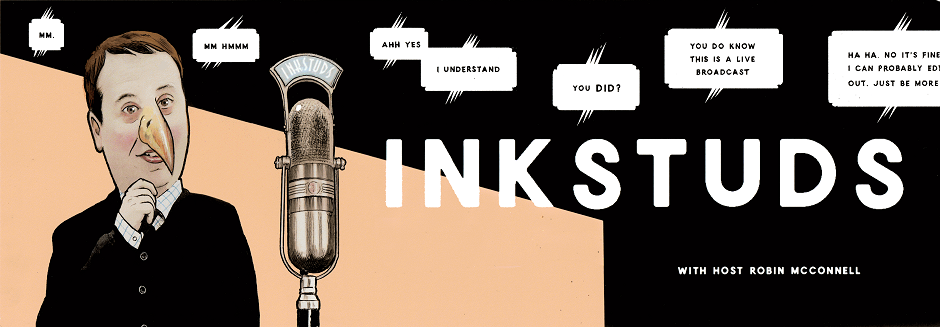


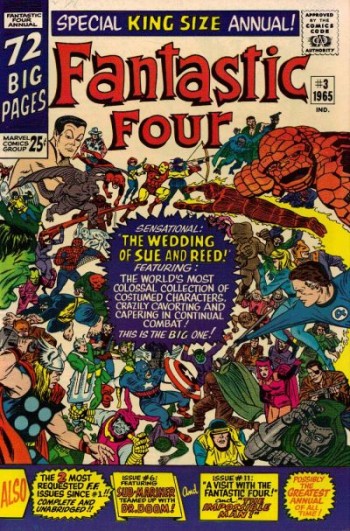

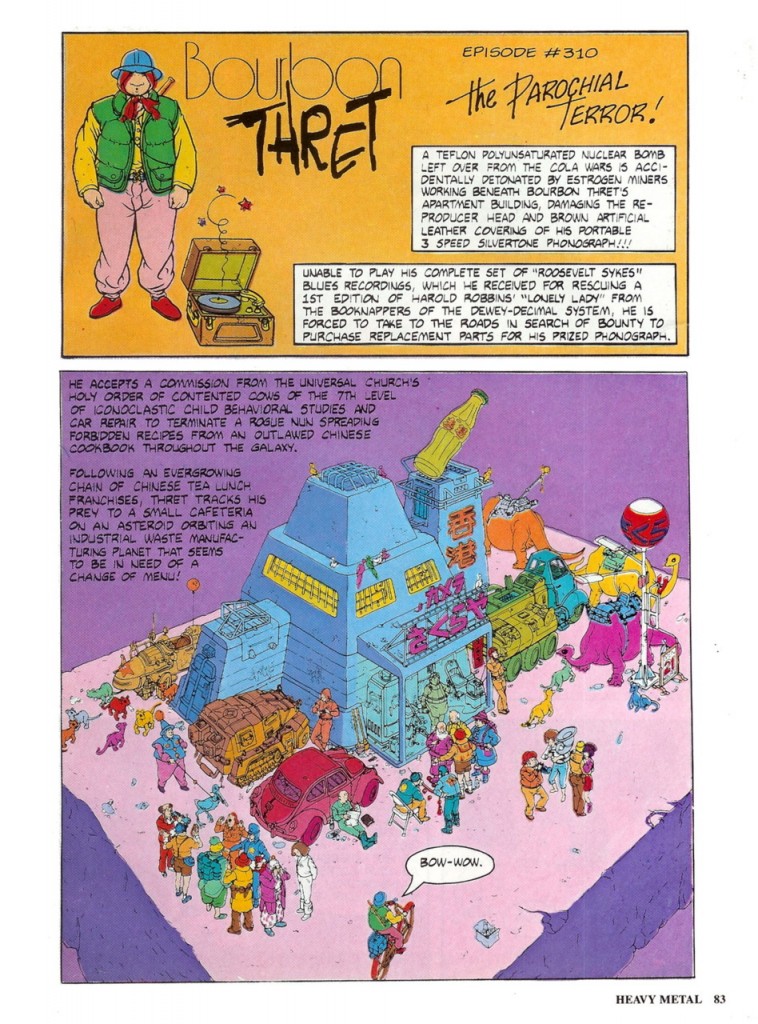
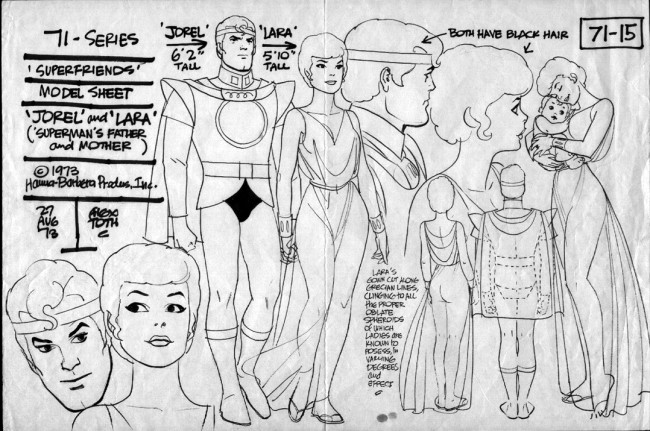

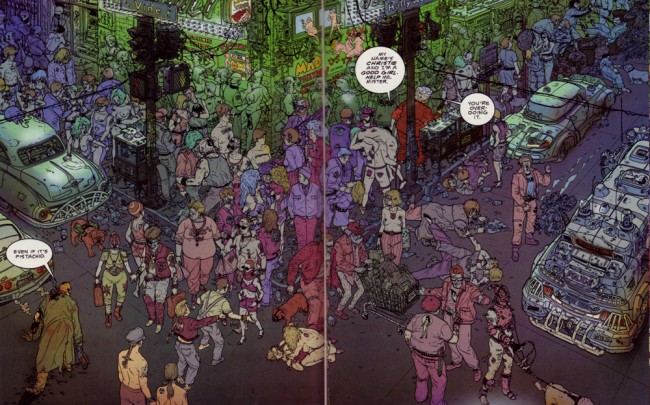

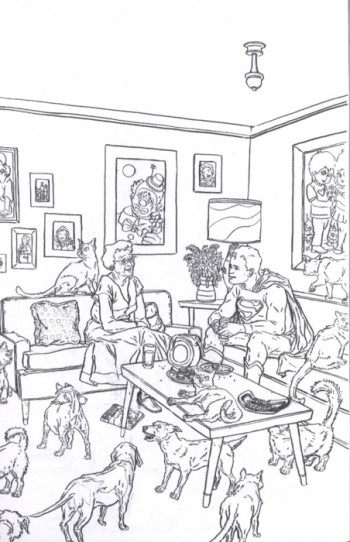
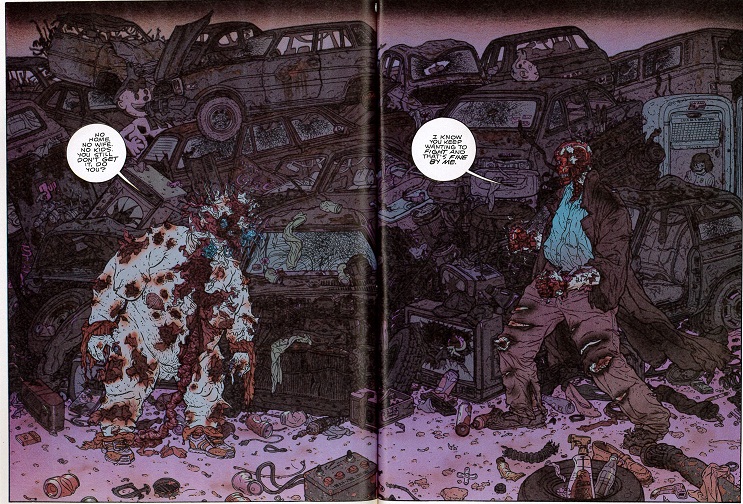
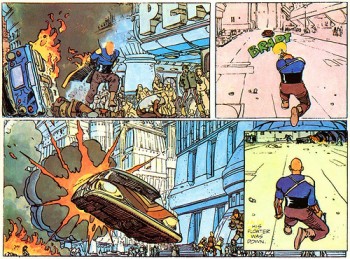
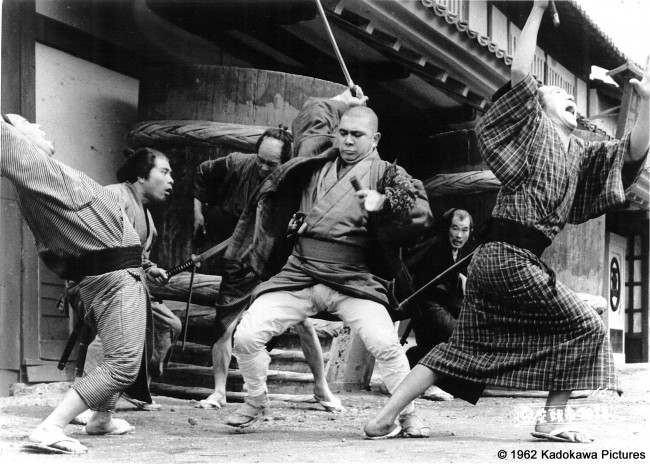
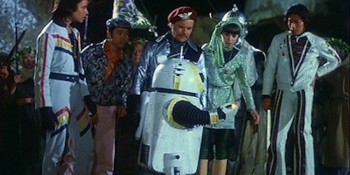
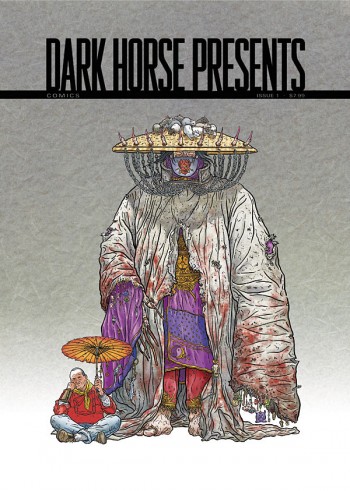
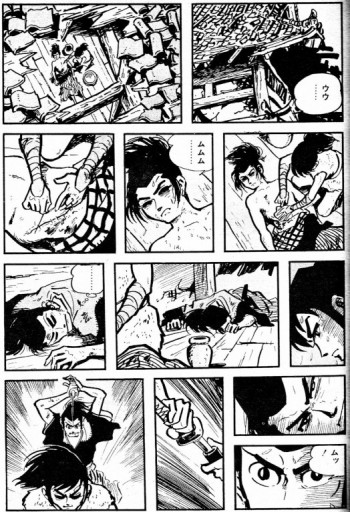


once again great job, i love darrow, he should do more interviews…
I agree. He some great knowledge and experience.
Pingback: Behold the Geof Darrow Superman cover that never was | Robot 6 @ Comic Book Resources – Covering Comic Book News and Entertainment
A wish come true for me thank you for the excellent soul soothing interview! If I had another wish I’d wish it had been a three part interview like the one with Gary Panter… what would I do with my third wish? Hmmm… I’d wish for 3 more wishes, duh.
Pingback: Carnival of souls: Special “pre-BCGF” edition « Attentiondeficitdisorderly by Sean T. Collins
Pingback: The Geof Darrow Superman cover that never was…will be | Robot 6 @ Comic Book Resources – Covering Comic Book News and Entertainment
Cool. Interview. I learned some cool things, but funny to see how Geof tells the same stories verbatim. The irony was his telling of Toth, and how Toth cut people off if they say/said one wrong thing.
Lovely to hear Geof’s charming, funny, smart, self-deprecating voice again. He is the most hilarious, quick-witted dinner companion, besides being among the best of our artists.
Thanks Paul, I need to interview you one day too!
Yes, please! I miss Concrete.
Incredible, I didn’t know about all this connection between Darrow, Moebius & Jodorowsky
thanks for enlightening a french reader.
Awesome interview
N.A.
Thanks man! they are interesting group of guys.